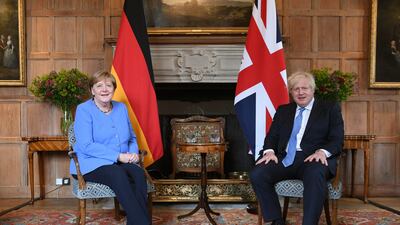Vaccinated British travellers could soon be able to travel to Germany without going into quarantine, says German Chancellor Angela Merkel.
In a significant change of tone after previously lobbying for EU-wide restrictions on Britain, Ms Merkel said the travel rules could be eased in the foreseeable future.
Under current rules, people arriving from Britain must spend 14 days in isolation with no reprieve for vaccinated people or those who test negative for Covid-19.
But the measures have not prevented the rapid rise of the Delta variant in Germany, where it is expected to become dominant within weeks.
As a result, Britain could soon be moved from Germany’s list of variant hotspots to a lower tier of countries with high infection rates.
Ms Merkel held talks with UK Prime Minister Boris Johnson at his English country residence Chequers on what is likely to be her last official trip to Britain.
“We adopted certain protective measures when we were not so familiar with the Delta variant,” she said.
“We now see that the share of Delta cases is rising very quickly in Germany, and we are continuously reviewing restrictions.
“I expect that in the really foreseeable future, fully vaccinated people will be able to travel without going into quarantine.”
Mr Johnson welcomed Ms Merkel’s remarks. “I think that’s great and that’s right. It sounds as though progress is being made,” he said.
The leaders remained at odds over crowds at the Euro 2020 football tournament, after German politicians voiced alarm over the large crowds in London for Tuesday's England v Germany match.
"I am worried and sceptical about whether this is good," Mrs Merkel said of the large numbers of spectators. But Mr Johnson said there were no plans to reduce them.
After heavily restricting travel on Britain, Germany pushed for other EU countries to follow suit.
But it failed to persuade tourism-reliant countries such as Portugal, where travel from Britain is still possible for vaccinated people.
Britain wants to open up foreign travel for the majority of its adult population who have been vaccinated against Covid-19.
The meeting comes amid efforts to renew the Anglo-German relationship in the wake of Brexit.
Britain and Germany set out plans for closer ties this week in a joint declaration in which the UK voiced support for giving Berlin a permanent place on the UN Security Council.
Mr Johnson's efforts to move past Brexit have been hampered by lingering tensions over Northern Ireland which hung over last month's G7 summit in Britain.
But Ms Merkel said she was optimistic that a three-month delay to customs checks in Northern Ireland could be used to find a solution.
“In that time, it should be possible to solve this in a pragmatic way. I am optimistic that it will be possible,” she said.
Ms Merkel addressed a meeting of Mr Johnson’s cabinet as part of her visit, making her the first foreign leader given this privilege since former US president Bill Clinton in 1997.
Mr Johnson said that London-Berlin ties had been “re-energised and re-invigorated for a new era” during Ms Merkel’s tenure.
The two leaders agreed a series of measures on cultural ties between the countries, including a prize for scientific innovation.
Ms Merkel is meeting Britain's Queen Elizabeth II at Windsor Castle on what is one of a series of farewell trips.
She is not seeking a fifth term in office when Germany goes to the polls for a general election on September 26.


